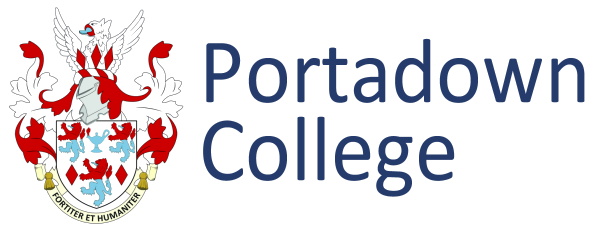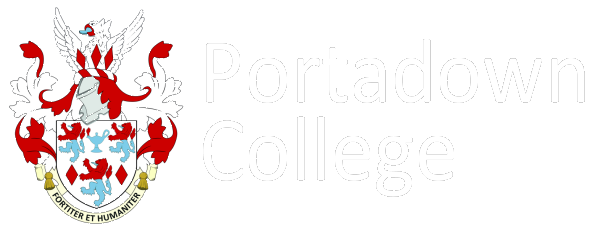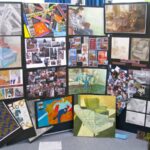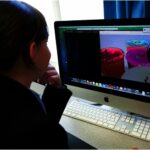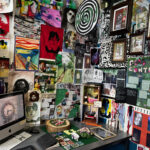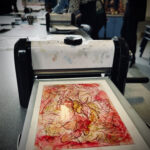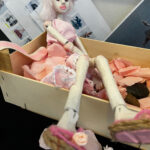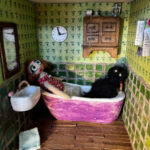Mrs Z McAleece (Head Of Department)
Mrs O McShane
Art (subjects: Art & Moving Image Arts)
Ethos Aims and Objectives of the Art Department
Art & Design is one of the main creative outlets for the Students in Portadown College. The prime aims are to develop in our students an appreciation and love of visual culture and to provide opportunities for the students to experience the whole range of creative activities available in the subject. The programme is designed to foster ability and we aim, by creating a caring and accepting environment, to allow talents to emerge and develop.
Art & Design aims to give students opportunities to develop:
- Creative and imaginative powers, and the practical skills of communicating and expressing ideas, feelings and meanings in art, craft and design and the moving image;
- Investigative, analytical, experimental and interpretative capabilities, aesthetic understanding, critical skills and the ability to realise intentions;
- Understanding of codes and conventions of art, craft, design and the moving image and awareness of contexts in which they operate;
- Knowledge and understanding of art, craft and design in contemporary societies and in other times and cultures.
- The potential to achieve highly in the chosen subject / Level through an embedded understanding of the relevant Assessment Objectives.
- Personal development through the encouragement of self-discipline and organisation, self-esteem, self-confidence, moral awareness and decision making.
- The skills and understanding necessary to prepare for GCSE, AS and A2 Art and Design and AS and A2 Moving Image Arts.
Moving Image Arts aims to:
- provide an enhanced learning experience through a state-of-the-art iMac suite with industry standard software, lighting and audio equipment;
- allow students to express themselves through the medium of film and sound;
- provide students with the requisite skill and knowledge to enable them to take their first steps to a career in Creative Media, which is the fastest growing industry in Northern Ireland.
The Art and Design and Moving Image Department has recently been refurbished. Facilities and resources include:
- A dedicated Building.
- Two Art and Design Specialist Studios.
- Sixth Form Art Centre
- Animation Studio
- Music / Drama suite
- Kiln Room / Ceramic Area
- Exhibition space
- The Moving Image Arts studio. The Studio is a fully equipped suite complete with iMacs, iPads, industry-standard software, lighting and sound technology, etc.
As Art and MIA extends beyond the classroom trips are a very important part of our studies. Annual trips include: The True Colours Showcase Event for Art, RUA Annual Exhibition, The Moving Image Arts Showcase Event, as well as other exhibitions and workshops when available.
As MIA extends beyond the classroom trips are a very important part of our studies. Annual trips include: CCEA Moving image Arts Showcase event, events and workshops run by Cinemagic as well as other screenings and workshops to help develop skills and film appreciation.
GCSE ART & DESIGN
Examination Board: CCEA
What is GCSE Art and Design about?
Students of our GCSE Art and Design course engage in a critical, practical and theoretical study of art and design. They develop an appreciation of the work of artists, designers and craft workers from a range of cultural backgrounds. They also develop their artistic creative practice through a wide range of media and processes.
What will I study and how will I be assessed?
| Content | Assessment | Weighting |
| Component 1 Part A: Exploratory Portfolio Part B: Investigating the Creative and Cultural Industries This is a linear qualification.
| Part A: Controlled assessment Internally set and assessed Externally moderated Part B: Controlled assessment Internally set and assessed Teacher sets tasks based on examples from controlled Assessment booklet which is set by CCEA. Externally moderated | 60% Part A: 25% 50 marks Part B: 35% 70 Marks
|
| Component 2: Externally Set Assignment | Controlled Assessment Externally set examination Internally assessed Externally moderated A stimulus paper is set by CCEA. This provides a choice of theme starting points. | 40% 80 Marks |
What can this subject lead to?
This course prepares students for the study of art and design and related courses at A Level and beyond. It also provides students who have an interest in developing a career in art and design with relevant, skills-based knowledge. Possible Careers include Media, Graphics, Web Design, Architecture, Textile Design, Fashion, Buying, Interior Design, Teaching and Art Therapy.
GCSE MOVING IMAGE ARTS
Examination Board: CCEA
What is GCSE Moving Image Arts about?
GCSE Moving Image Arts is one of the most exciting and current subjects on the curriculum. Students study the practical and theoretical processes of filmmaking and enjoy experimenting with various types of media including audio. You will have the opportunity to work on a range of tasks, including planning and creating moving image products.
What will I study and how will I be assessed?
| Content | Assessment | Weighting |
| Component 1: Critical Understanding of Creative and Technical Moving Image Production
| Compulsory online examination 1 hour 30 mins The examination features:
CCEA Set and mark this component | 40%
|
| Component 2: Acquisition of Skills in Moving Image Production
| Compulsory controlled assessment tasks Students complete four tasks specified in the Component 2 Task Booklet:
Internally assessed & externally moderated | 20%
|
| Component 3: Planning and Making a Moving Image Product
| Compulsory controlled assessment portfolio Students produce a live-action or animated film portfolio from a selection of genre-specific production briefs that CCEA provide. The portfolio must feature:
Internally assessed & externally moderated | 40% |
What can this subject lead to?
This linear course provides a solid foundation for progression to GCE AS/A2 Moving Image Arts, other subject-related qualifications, vocational training and employment within the creative industries.
Art and Design
Examination Board: CCEA
What is A Level Art and Design about?
Through studying GCE Art and Design, students have opportunities to develop an interest in and enthusiasm for art, craft, design and media. Students gain knowledge and understanding of all Art based disciplines whilst gaining experience in working in a broad range of processes and materials.
What will I study and how will I be assessed?
| AS Content | Assessment | Weighting |
| AS 1: Experimental Portfolio Students develop, explore and record ideas. Students base their portfolio on a theme that CCEA issue in a stimulus paper at the beginning of the AS course. | Teachers assess students’ work and CCEA moderate the results.
| 50% of AS 20% of A Level
|
| AS 2: Personal Response Students present a personal outcome. In this unit, students respond to a theme that we issue in a stimulus paper at the beginning of the AS course. It includes developmental work and an outcome that stems from the research and exploratory work completed for Unit AS 1 | Teachers assess the controlled task and CCEA moderate the results.
| 50% of AS 20% of A Level
|
| A2 Content | Assessment | Weighting |
| A2 1: Personal and Critical Investigation This unit includes both practical and written investigations and the use of theoretical research. Students demonstrate understanding through integrated practical and written forms. Written investigation 1000–3000 words – externally assessed 20% of A2 12% of A level | Teachers assess the practical investigation and CCEA moderate the results. 40% of A2 24% of A level
| 60% of A2 36% of A level
|
| A2 2: Thematic Outcome In this unit, students respond to a theme that we issue in a stimulus paper at the beginning of the A2 course. This unit includes developmental work and an outcome which stems from the personal investigation completed for Unit A2 1. | Teachers assess students’ work and CCEA moderate the results.
| 40% of A2 24% of A level
|
Are there any particular qualities or skills I should have to study this course and to what kind of careers can it lead?
Students studying AS and A2 Art and Design need primarily to be imaginative and creative.
They should be able to work independently and make their own critical judgements whilst having a good knowledge and understanding of Art and Design processes and theory.
Possible careers include: media, graphics, web design, architecture, product design, film and animation, textile design, fashion-buying, interior design, teaching and art therapy.
Entry Requirements: Grade C* or above in GCSE Art and Design.
Moving Image Arts
Examination Board: CCEA
What is A Level Moving Image Arts about?
Moving Image Arts is the study of films and filmmaking through the process of making your own short live action film or animation. Moving Image Arts is a combination of all other art forms (performance, musical, visual, physical, lyrical, textual). This subject aims to develop imaginative, creative, and expressive skills through the use of a range of professional industry level software used in the well-equipped Mac Editing Suite.
What will I study and how will I be assessed?
| AS Content | Assessment | Weighting |
| Unit AS 1: Critical Appreciation and Application of Visual Storytelling Techniques: Foundation Portfolio | Students must produce:
Teachers mark the coursework and CCEA moderate the results. | 24% of A Level |
| Unit AS 2: Critical Response | Students take a 1.5hrs Online External Examination with questions on clips from set study areas.
| 16% of A Level |
| A2 Content | Assessment | Weighting |
| Unit A2 1: Creative Production and Research Advanced Portfolio | Students must produce:
Internal Assessment | 36% of A Level |
| Unit A2 2: Advanced Critical Response | Students take a 2hr 15min Online External Examination with questions based on clips from set study areas and an unseen script.
| 24% of A Level |
Are there any particular qualities or skills I should have to study this course and to what kind of careers can it lead?
Moving Image Coursework is ‘hands on’. Candidates must be creative and keen to develop technical film making skills. All candidates will develop and edit a short live action film or animation and produce materials to support their production. They will experiment with various filmmaking techniques and styles. Candidates will analyse film sequences, past and present, and will sit an on-line theory exam.
Studying MIA is a gateway into the creative digital industries. Many students who have studied this subject have progressed onto specialist degree courses. A degree in one of the many areas of Film or Media can offer dynamic and wide-ranging choices of careers. Whether it is scriptwriting, set design, costume and makeup, storyboarding, art directing, animation, film or television, MIA equips you with excellent foundation skills for all of these areas.
Entry Requirements: C* in English Language or English Literature. Direct entry subject: students do not need to have studied Moving Image Arts at GCSE level to select this subject.
The Department promote Creative Careers throughout all courses. Schemes are designed to reflect current employment trends both locally and Nationally dedicated careers lessons are delivered to all students and relevant trips are arranged.
Many workforces require creative and original thinkers, people who are able to adapt to different processes and workloads and people who can work independently and as a team. In Art and Design, pupils are encouraged to develop and explore new and exciting materials and techniques allowing them to enhance their thinking skills and personal capabilities that will benefit them beyond the classroom.
The Department works closely with the Creative Learning Centres and other agencies as relevant; students regularly avail of work experience and workshops. The Art and MIA department works closely with other departments to support student needs.
The study of Art and Design and MIA is useful for careers in areas such as:
- Advertising
- Animation
- Archaeology
- Game Design
- Architecture
- Web Designer
- App Designer
- Community Artist
- Film and Video
- Artist
- Fashion Design
- Fashion Buyer
- Line Crafts
- Illustration
- Art Management
- Interior Design
- Landscape Architecture
- Cinematographer
- Make-up
- Model-making
- Costume Designer
- Craftsperson
- Graphic Design
- Photo-Journalism
- Product Design
- Set Designer
- Industrial Design
- Restoration
- Teaching
- Theatre Design
- Photographer
- Television/Media
- Textile Design
USEFUL LINKS
Museums and Galleries
Local
National
- Tate Museums
- The British Museum
- Victoria and Albert Museum
- National Galleries of Scotland
- Ashmolean Museum
- National Portrait Gallery
- National Gallery
- Royal Academy Gallery
- Whitechapel Art Gallery
- The London Street Gallery
International
- The Vatican Museums
- The Louvre Museum Paris
- Musee D’Orsay Paris
- Auguste Rodin Museum, Paris
- International Gallery, Italy
- Ufizzi Gallery, Florence
- Prado Museum, Madrid
- Thyssen Bornemisza Museum, Madrid
- Michelangelo’s House, Florence (Casa Buonarroti)
- Villa Borghese Gallery, Rome
- Capitoline Museum, Roma
- Museum of Modern Art, New York
- Guggenheim Museums
- Metropolitan Museum of Art, New York
- Wolfsonian Collection
- John Paul Getty Museum
- Minneapolis Institute of Arts
- Philadelphia Museum of Art
- Whitney Museum of Art
Journals
- Architects Journal
- Selvedge
- Eye
- Crafts
- Ceramic Review
- AN Magazine
- Art Monthly
- Art Forum
- Frieze
- Irish Arts Review
- Baseline
- Creative Review
- Source
Archives
- Chester Beatty Library
- The Royal Institute of the Architects of Ireland
- Gombrich Archive
- VADS: Image Collection
Other
- Art 21
- TED Talks
- Design Council
- Crafts Council, England & Wales
- Craft NI
- Crafts Council of Ireland
- Craftscotland
- SOFA
- Moving Picture
